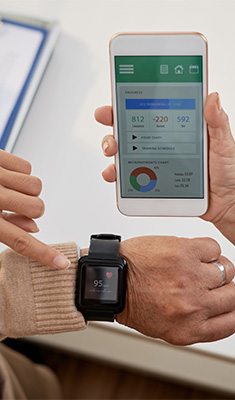Mobile Health Technology Increases Patient Empowerment
Healthcare organizations embrace mobile technology to meet patient demand


Philip Blanks
Director of Product Marketing
As patients demand greater control over their healthcare journeys, healthcare providers are struggling to embrace the shift to mobile technology. Automated tools have made other aspects of their lives more convenient, and patients want to use these types of solutions to improve their healthcare experiences.
Across the world, consumers have become increasingly dependent on mobile devices to make travel reservations, order food, deposit checks and video chat with family and friends. Understandably so, consumers’ expectations for interacting with healthcare providers have drastically increased over the recent years as well.
Considering that more than 52 percent of people use their smartphones to retrieve information about their health, healthcare consumers are beginning to demand convenience and process simplicity from providers. They want to be able to use smart phones to do everything from scheduling appointments and refilling prescriptions to communicating with physicians and other medical staff and completing required paperwork. Thus, the number of mobile health apps on the market has nearly doubled in the past few years. Mobile health apps, also known as “patient wellness apps,” are an emerging patient engagement technology that enable patients to, for example, message with their physicians, refill prescriptions, check symptoms and monitor their heart — all from their smart phones.
These apps also present a unique opportunity for healthcare providers. Organizations can access data from these apps and monitor a patient’s health outside of care visits. Not only are providers able to spot potential problems before they become serious issues, they can also intervene with education, coaching and other strategies to reduce the need for costly office visits. They are able to provide a more customized care experience because they have a more longitudinal view of their patients’ health and wellness. Although many organizations are just starting to explore these applications, they will likely become more prevalent in the future.
Recognizing the importance of adopting mobile technology in healthcare, a 2018 Physicians Practice Mobile Health Survey found that nearly 80 percent of physicians use mobile health technology in their care delivery every week. And more than 70 percent of physicians use tablets and smartphones in their practice regularly.
Meanwhile, healthcare organizations that have already began integrating mobile technology into their processes are starting to see the benefits that a mobile technology footprint can bring to their patient workflows. For starters, providers can help to streamline care and help patients become more engaged in their own care by integrating solutions that enable electronic patient registration and document signing – even before their care visit. Leveraging solutions with mobile capabilities can help to smooth patient access and eliminate the tedious process of completing paperwork while waiting to see the doctor.
In some cases, patients can even use their personal handheld devices to sign consent forms and complete documents. These tools help streamline registration for a healthcare organization because the registrar no longer has to manually follow up on incomplete information
However, this growing trend in healthcare consumerism comes with its own set of challenges. Daunting HIPAA-compliance regulations and security risks have made it a bit more difficult for the healthcare industry to adopt a mobile mindset. As a way to address this concern among providers and patients, many mobile technology solution providers have prioritized patient data security and HIPAA laws in their product development, making it easier for healthcare organizations to implement patient-centric technology in the hospital environment.
No doubt, as technology continues to evolve, healthcare organizations will continue to explore and leverage mobile solutions to better engage patients and make care more convenient and efficient. Organizations that embrace this idea can dramatically improve their relationships with patients, making care more accessible and even more effective. The organizations that remain committed to engaging patients using mobile technology stand to better serve their patients with increased satisfaction, cost savings and improved engagement.


